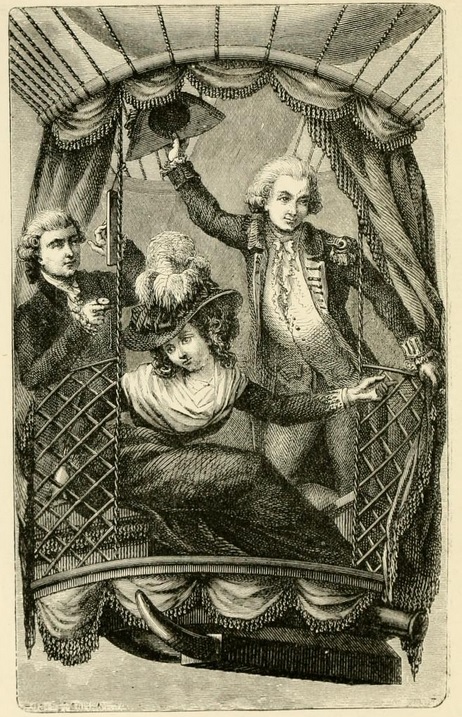The Air-Midshipman's Primer-Song
(Second Draught)
2013 August 26
2013 October 28
The following was written (rather hastily)
as a contribution to Dr. Melanie Karsak's interesting
Steampunk University series. With typical grandiosity,
I have decided that it should eventually balloon to roughly
ten times its present length.
I also plan to add a line-by-line prose commentary;
for the moment, the in-line references will have to do as a supplement,
providing a few of the details blurred by poetic license.
Updates will appear at Net Advance Retro from time to time.
--- NORMAN HUGH REDINGTON

The Air-Midshipman's Primer Song,
Being an Instructive Mnemonical Poem
Suitable for
Passengers,
Cabin Boys & Girls,
and All Others
New to Our Aërial Vessels
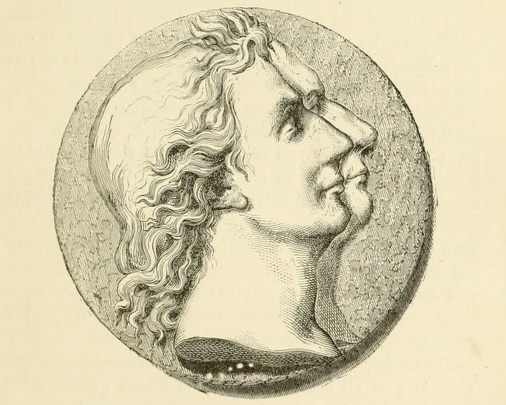
I. Of
Levity, and of the Two
Brash Brothers from Whom
Montgolfières Take Their Name
- Soaring, Muse, above the wind,
See us heavy, weighty things;
Though to spinning planet pinned
Each too soars who, soaring, sings.
-
Paper making was their trade,
First ascenders to the sky.
All the money that they made
They spent learning how to fly.
- They knew little. Much was known;
Newton's heirs were long grown old.
Great savants had half-way shown
Half the laws of heat and cold.
- These two knew this by report,
But they trusted things they saw.
What they saw did not support
Newton's universal law.
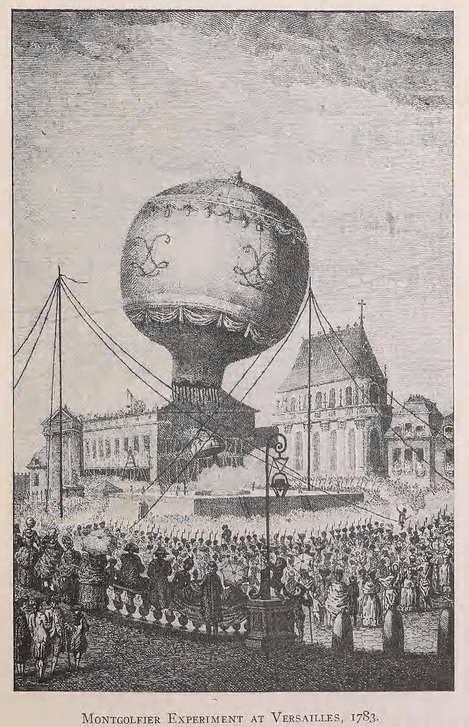
- From their factory's chimney poured
Soot and smoke. It always rose
Falling upward. Did the Lord
Grant exemptions when He chose?
- Gravity, of which they'd heard,
Theoretically applies
To all matter. Then what stirred
Chimney-smoke and soot to rise?
- Could its mass be less than nil?
If so, fill a bag with it.
Bottled smoke then surely will
Carry up the bag a bit.
- Thus the Brothers Montgolfier
Harnessed smoke, or so they thought ...
Made it lift things in the air.
What if they'd been better taught?
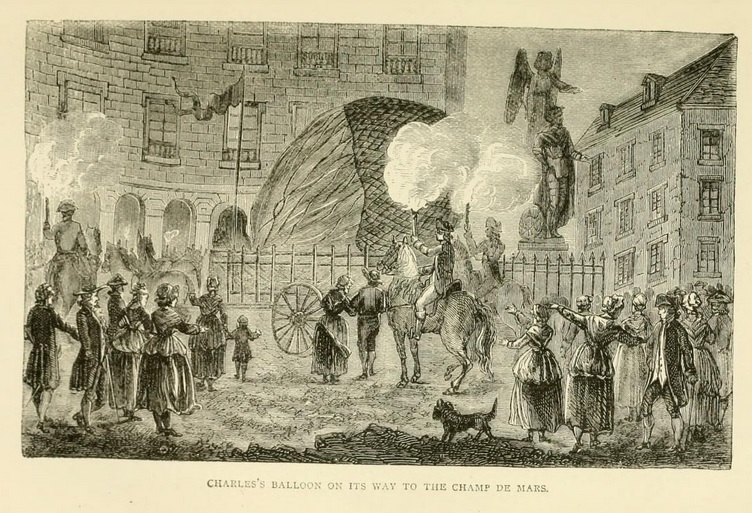
II Of the
Learnèd Savant from Whom
Charlières Take Their Name
- News, although its pace be slow,
Travels surely around France.
Learnèd doctors, once they know,
Smite their brows for their missed chance.
- "Let's assume all's fair and square,
They've done what they say they did;
Still it's clear this clever pair
Keep their real method hid.
- "How could anyone accept
Antigravitating smoke?
Buy the rest, but that reject;
Surely it must be a joke.
- "Likely, in their secret lab,
They've evolved some novel gas
Whose each volumetric slab
Has exceedingly low mass."
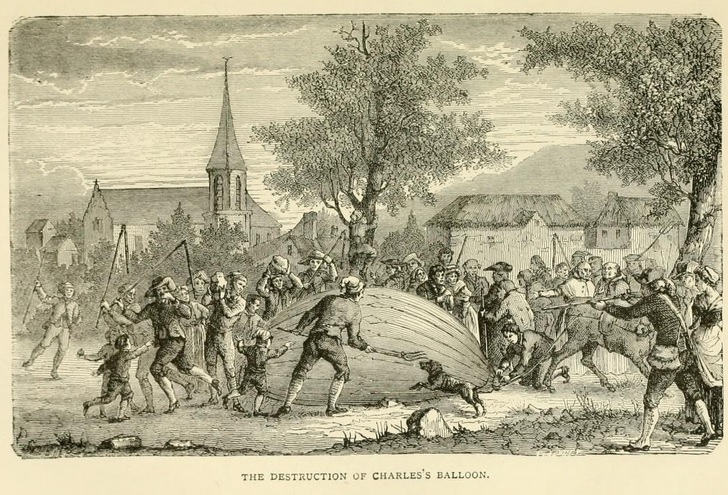
- High-school kids still know his name,
Lawful
Charles who thus speaks.
Laws for gases brought him fame;
It's a new gas now he seeks.
- Or an old one. "Yes, perhaps
That one, easy to inflame!"
(When a few more years elapse
Lavoisier will coin its name.)
- Thus the hydrogen balloon
Rose into the world's ken;
Armstrong's journey to the Moon
Started here with these three men.
- Epics start in medias res;
There are always older tales.
Old philosopher, undress,
Bathe, and think of gold-smith's scales.

III. Of Archimedes His
Principle
- Hiero, King of Syracuse,
Hired smiths he did not trust:
"Why should I endure abuse?
Paid for steel, they sell me rust.
- "What then of this golden crown?
Is it gold, or gold alloyed?
Archimedes, friend, come down:
Thus this fraud may I avoid."
- All remember
what came then:
How the sage ran naked out
From the bath, and this was when
He exclaimed his famous shout.

- Archimedes, wise and great,
Why didst thou not this explore?
Plato (
Phædo 58):
Earth's an airy ocean's floor.
- Whether any solid chunk
("Earth its element" your phrase)
Floats or sinks (so ships are sunk)
Hangs, in part, on what it weighs;
- But it turns,
you found, as well,
On the water's weight displaced.
That's the reason for your yell,
Was it not, that day you raced?
- Now remember Plato's sea:
All the earth's submerged in air.
Buoyant air must therefore be
Pushing objects everywhere.
- If the content of a jar
Could weigh less than when unsealed
It would rise like Luna's car
Here's the key to flight revealed.
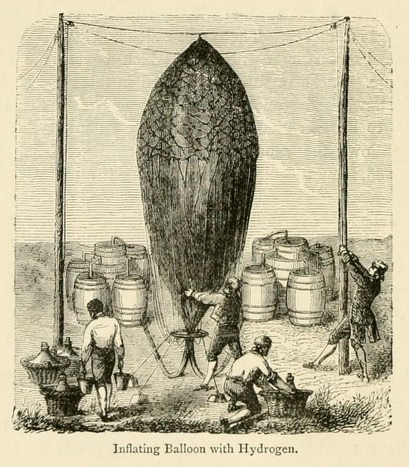
IV. Of the Lifting Agent, Less Dense Than Air at the Ground.
- Greeks, so clever and so sly,
You had theory, but lacked ... what?
Say the Greeks had learned to fly ...
Then again, those Romans ... But ...
- Leave to sandalpunks such thoughts.
Now: what's lighter than cool air
And available in lots
To fill up a Charlière?
- Methane. (Well, for now it's cheap) ...
Hydrogen's two-proton mass
Makes it worth one's while to keep
That explosive, common gas ...
- Helium,
native to the Sun
Seeps through
Texas underground.
Squandered in the name of fun,
Rarely and with hardship found:
- Its disdainful, noble ways
Make it safe from plebian fire,
But, in giving it due praise,
Bear in mind its cost is higher.
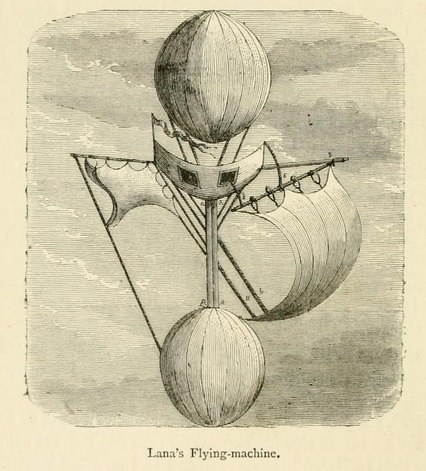
-
Vacuum might seem best of all:
Father Lana, priest of God,
Saw an empty metal ball
Fixed upon a metal rod.
- Bold idea -- but,
alas,
Air would crush the metal flat.
Better stick with some light gas:
Scientists concur with that.
- (Nineteen-fifty, there around,
Racing took another track.
There, hot-air balloons abound:
Bottled propane brought them back.)

V. Of Non-Dirigible Balloons.
- Albuquerque! Hear it call:
"Come down to our
yearly fest!
Montgolfières like leaves in Fall
Blow below Sandía Crest!"
- Archimedeans too, of course --
(Air when heated grows more thin) --
They are raised by buoyant force
'Til the same without and in.
- Noisy; dangerous to ride;
Doomed from time to time to hit
Power-line or mountain-side
Since they can't steer clear of it;
- Floating stoves: They hardly seem
Butterflies en route to Oz,
Fairy-fluff, incarnate dream.
It's enough to give one pause.
- That the clumsy Montgolfière
Still prevails is jolly odd.
Hail instead the Charlière,
Rising silent as a god!
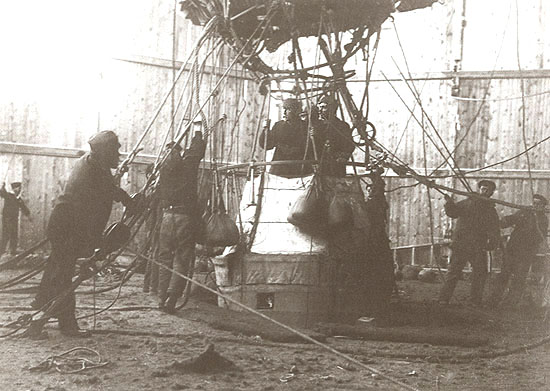
- Leaving the Socratic beach,
Aëronauts, prepared to die,
Drifting out of human reach,
Mapped the layers of the sky.
- Who can keep their tongues from praise
Of the
Charlière pioneers:
Seekers after
cosmic rays,
Astronauts of other years?
- Still, these graspers for the moon
Would have given much away
For a steerable balloon:
Dirigeable, en Français.
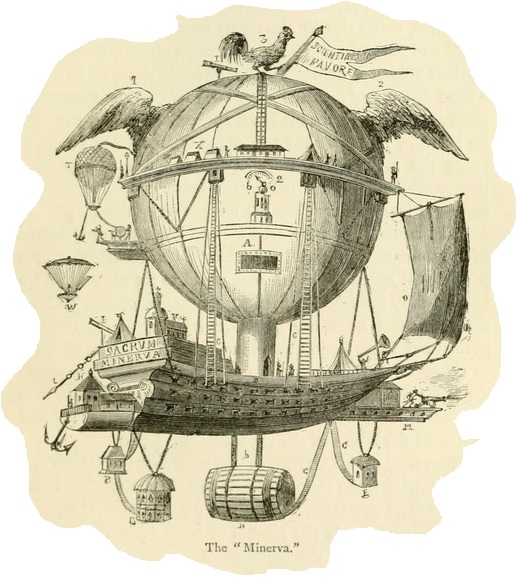
VI. Of Dirigible Balloons.
- Sailors tried all that they knew:
Rudder, paddles, oars, and sail;
But an airship's no canoe
All these tricks were bound to fail.
- Blown along, great schooners skim
On the interface they ride.
Submarine-like, airships swim,
Sunk in Plato's ocean's tide.
- They are fishes.
Shape them so:
That's the secret. Big cigars
(Prolate spheroids) channel flow
Well enough to carry cars.
- Thus began the airship's reign --
Well, that's strong, I must admit.
Always threatened by the 'plane,
They were no great threat to it.
- Gaul-like, dirigibles are classed
Triply. First, "non-rigid" ones;
Then the rigid; then at last
Hybrids, so convention runs.

- First, let's take the simplest kind.
Some once named them "Class B (Limp)".
Any child's balloon you find:
Fins and engine make a blimp.
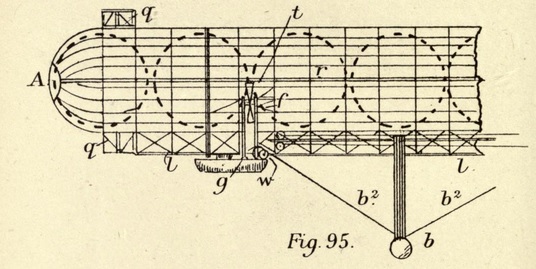
- Next the Zeppelin. Rigid chest
Holding gas-bags uninflate,
Like the lungs within your breast.
Fill them up: you levitate.

- "Semi-rigids"? France built most.
Crash and fire took their toll,
But these centaurs still could boast
They were first to reach the pole.

VII. Of Propulsion.
- Archimedes! Come again,
Patron of the engineer;
Teach air-women and air-men
What propels the ships they steer!
- "Screws are double ramps wrapped 'round
Helixwise. When they are spun,
They will sink into the ground
Or the ground comes up the run.
- "Screws in water, with a dip,
Carry water 'round a flue.
That can push along a ship.
Air is just a fluid too.
- "Any ancient could have built
Boats with canted paddle-wheels.
Give them lightweight wings that tilt,
And balloons to lift their keels.

- "Wings
held level: steady flow.
Watch the stream-lines passing by.
As above, so too below:
Hermes told you so, not I.
- "Change the angle of attack.
Still at first the streams
flow straight.
Then a vortex leaves the back:
All the wing will elevate.
- "Wings outspread in wind thus rise,
But an angel flies not so;
Whirling wings will lift the wise,
Or propel them to and fro."
-
Helicopters were too tough
(Robur conquered them, of course)
But
propellers were enough
To supply a forward force.
VIII.
The Catalogue of Ships.
- Now I praise the famous ships
Whose mere names evoke each age.
As their names pass from my lips,
I cry "Hand off and engage!"

- Précurseur! Half blimp, half clock.
Just a toy? Henri Giffard
Saw her worth and did not mock;
Still the starward road was hard.
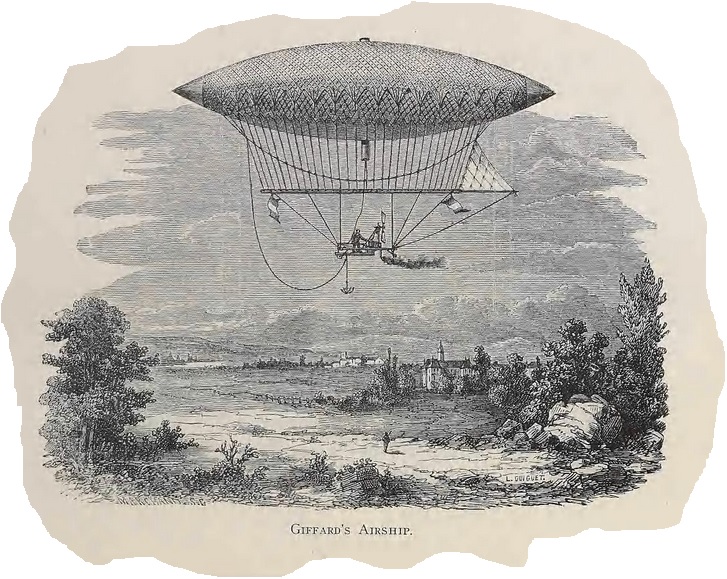
- Just a few in thirty years,
(First Giffard in his cigar) ...
Some with steam and some with gears ...
Most could barely lift their cars.
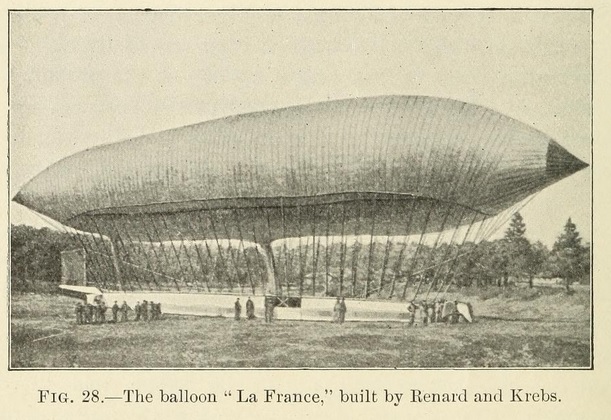
- Vive La France! Let us extol
Her electric-powered flight.
Here was lift, here was control,
Aviation was in sight.
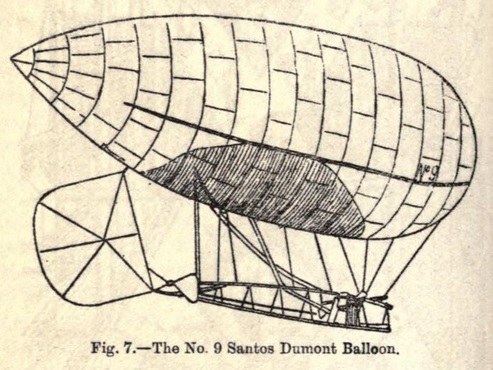
- Number Nine: the private yacht
Of a genius-millionaire,
When Santos-Dumont still sought
Aircraft lighter than the air.

- Shenandoah: first to use
Helium for safety's sake.
Lost at sky one fatal cruise:
Whom the gods desire, they take.
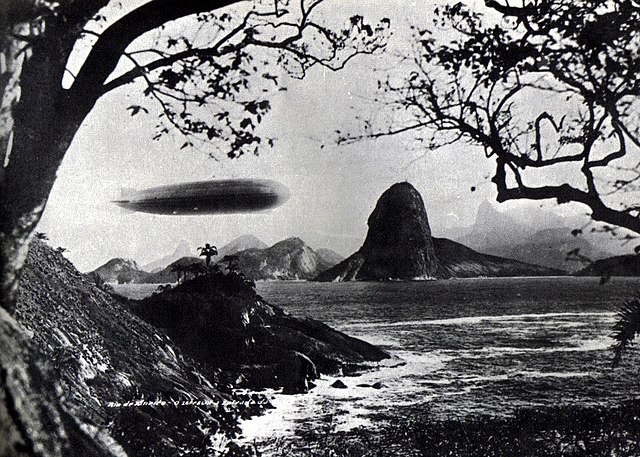
- Great Graf Zeppelin, of all times,
You were boldest and were best.
All meridians, many climes,
Saw you flit from branch to nest.

- Hindenburg brings up the end;
Broken crosses mar her tail.
Flames consuming her portend
Greater flames soon to prevail.

IX. An Unwelcome Intrusion by the God Mars.
- Searchlights blaze ... the fields as well ...
England's burning: not the Blitz.
This forgotten glimpse of Hell
Has no Adolf, only Fritz.
- Let the God of War explain:
"Airships, like all works of man,
Squarely fall in my domain.
I will use them when I can.
- "Once they only served for spies,
Tethered safely, far from harm,
Hoisting men with watchful eyes,
Quick to sound the first alarm.
- "In the clash of Blue and Grey,
Ladies, barred from active fight,
Gladly gave their gowns away
So observers could take flight.

- "Curious Germans came to learn.
One, named Zeppelin, took good notes.
Fifty years on, cities burn
Where the hostile Zeppelin floats.
- "Fifty years on, from the heights,
Airship crews play cat and mouse.
England quails when
Zeppelin nights
Shadow-over
Heartbreak House.

- "Terrifying, yes, but still,
For defenders, there is this:
When your foeman seems to fill
Half the sky, he's hard to miss.
- "What is more, he cannot gird
Armour 'round his heart and reins.
Light as air? A bit absurd.
In the next one, I'll use 'planes."

X. Valediction, for the Future.
- Silence! Shut thy barbarous maw!
Mars, enough! We long for peace.
If the airship has this flaw,
Give it gladly its release.
- In the age of nerves and jazz,
Peaceful Zeppelins ran commutes.
Thirty-Fourth Street's Empire has
Narwhal horns with ancient roots:
- Roots as old as dreams of flight,
Silent flight in lucid dreams,
Dreams to halt the hideous night,
Filling night with astral gleams.

- Jets are also dream-born craft,
(Dream-borne and dream-powered, too):
Sleek and bright from fore to aft,
Swift and powerful and new.
- Thus two paradigms are met,
One of patience, one of speed;
There the airship, here the jet ...
One for leisure, one for speed?

- Maybe not. The times may change.
Obsolescent things return.
Distant things may come in range,
Old resolve meet new concern.
- California's hangars now
Hold a novel craft or two:
Airship-makers have learnt how
To make ships while out of view.
- Friends, farewell. Go out, explore,
Seek the wind-whales, dare the blast;
Airships, risen or no more,
Fuse the future with the past.
